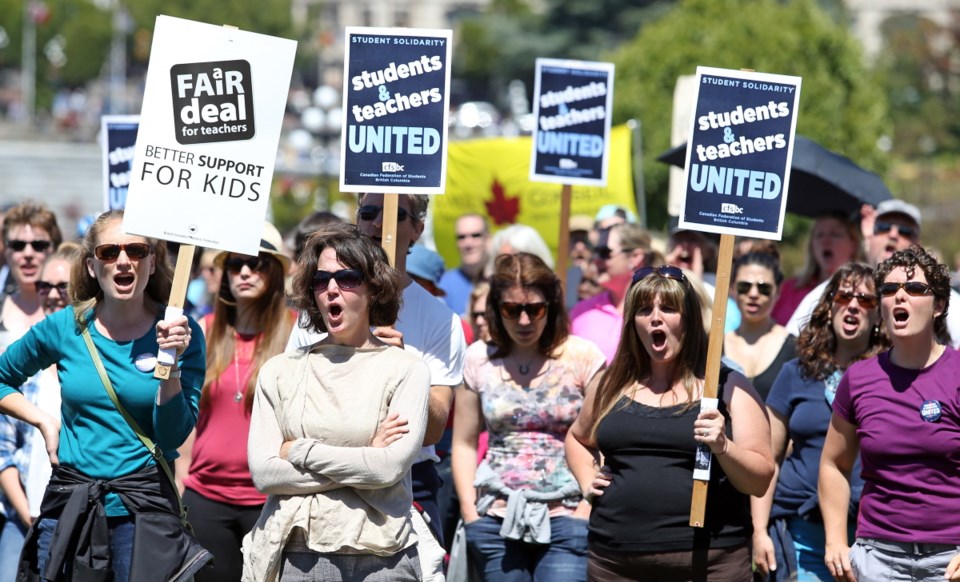The B.C. public education system descends, day by day, toward becoming an academic Third World wasteland where the agendas of warring parties are more important than educating kids.
The dramatist Aeschylus wrote 2,500 years ago: “In war, truth is the first casualty.” That has been repeatedly confirmed during the ugly back-alley brawl between the B.C. Liberal government and the B.C. Teachers’ Federation.
The government, which apparently has no interest in negotiating, insists that negotiation is the only way out of the impasse while ignoring the requirements of its own School Act that education for children up to the age of 16 is compulsory.
The government understands, but will not admit, that if its behaviour toward teachers and public education is yet again examined through an independent arbitrator’s lens, the government would stand a good chance of being publicly excoriated.
The BCTF, no matter what it says, fully understands why the government has no interest in third-party arbitration, but offers to submit its proposals to an independent arbitrator for judgment.
That is, at best, a misleading and deceptive pitch to its own members, as well as parents and kids. This is the same BCTF that has led those members into an impossible situation, leaving them to the mercy of an intransigent government.
Independent third-party binding arbitration — based on fact, not spin — would solve the problem and get the kids back to school. The greater risk is to the government, both politically and financially, something it can ill afford, even three years away from an election.
Let’s consider some facts that an arbitrator might consider, as opposed to the kind of expensive Three-Card Monte that sides seem to prefer to make their case.
In round figures, B.C. teachers with a master’s degree make between $52,000 and $81,000, depending on their years of experience on a 12-step scale.
Teachers in Alberta with a master’s’ degree and at the top end of the seniority scale make $99,000 and in Ontario would make $97,000.
Teacher benefits vary slightly across school districts in B.C, but average about $11,000. In Alberta, the average is $7,500 and in Ontario, $10,000.
If student performance on national and international tests were part of any consideration, the arbitrator might consider that B.C. students score the highest levels in reading and science skills, according to tests administered on behalf of the Organization for Economic Co-Operation and Development.
Students in Quebec score higher in mathematics than their counterparts in B.C., Ontario or Alberta.
Actual average class sizes at all grade levels are comparable in B.C., Alberta and Ontario. In Alberta and Ontario, class composition is a local school-board matter, not provincial.
No other government has illegally interfered with a teacher contract as regards class size and composition, as happened in B.C. in 2002.
While other factors compare well, teachers in B.C. are correct in saying that they receive significantly less in salary than their colleagues in Ontario or Alberta. Pensions, calculated based on the best five years of salary, are less in B.C.
An arbitrator might also consider the prickly political relationships between teachers’ unions and the provincial governments in all three provinces.
In Alberta, a move by government to have teachers requalify every three years has created tension and disagreement but has not, as yet, fractured public education.
In Ontario, the relationship is becoming tense, but Progressive Conservative leader Tim Hudak’s pledge to lacerate the public sector handed Liberal Premier Kathleen Wynne support from education unions, and now that is keeping a shaky temporary labour peace in schools.
In B.C., the government has spent much of the 21st century trying, by any means possible, out front or behind closed doors, to curb the education union’s power.
This dispute will be settled only if BCTF modifies its demands, but then the government, in turn, must face up to its responsibilities, get the kids back to school, call in an independent arbitrator, live with the resulting truth and move on to the next election.
Geoff Johnson is a retired superintendent of schools.



